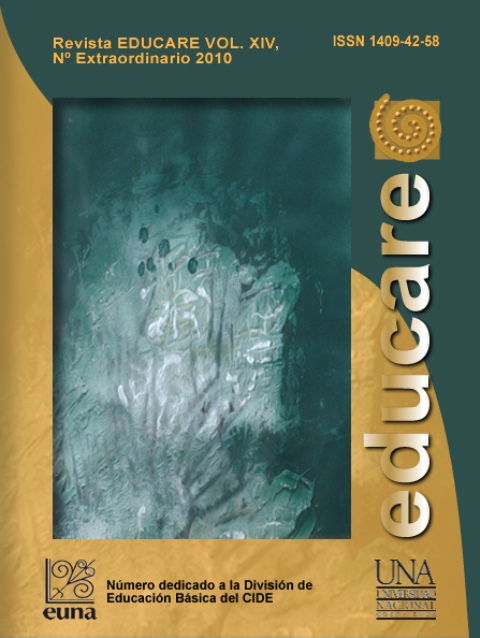Experiences from the course “Pedagogical Intervention in Preschool Education”: the vision from the faculty trainers, preschool teachers and students
DOI:
https://doi.org/10.15359/ree.14-Ext.6Keywords:
educational intervention, metacognition, preschool classroom, students, academics, teachers, reflective practiceAbstract
As part of the educational formation of students from II level of the Associate dregree, from the Pedagogy major with an emphasis on preschool teaching from Universidad Nacional. There is a course named “Pedagogical Intervention in Early Childhood Education” which carries out the process of the intensive practicum.
In this article you will find a review of the program’s objetives, experiences and challenges, taking the experiences from the academic team, who have guided this process over the past two years, and the point of views from students and preschool teachers.
References
Barberousse, P. (2003). Metacognición y educación. Universidad Nacional, Centro de Investigación
y Docencia en Educación, División de Educación Básica. Manuscrito no publicado.
Benito, A., Bonsón, M. e Icarán, E. (2007). Metodologías Activas. En Benito, Agueda y Cruz, Ana. (Coords.), Nuevas claves para la Docencia Universitaria en el Espacio Europeo de Educación Superior (2a. ed.), pp. 21-64. Madrid, España: Narcea de Ediciones.
Biggs, J. (1999). Calidad del aprendizaje universitario. Madrid, España: Narcea de Ediciones.
Intervención Pedagógica en el Aula Preescolar (Diplomado Preescolar). Intervención Pedagógica (Educación Especial Nivel de Bachillerato. Documento no publicado.
Flórez, R. (1994). Hacia una pedagogía del conocimiento. Santa Fe de Bogotá, Colombia: McGraw-Hill.
Universidad Nacional, División de Educación Básica, Comisión de Rediseño de la oferta Académica.(2008). Plan de Estudios de la Carrera de Pedagogía con énfasis en Educación Preescolar.Documento no publicado.
Ministerio de Educación Pública [MEP]. (1996). Programa de estudios Ciclo Transición. Ministerio de Educación Pública; San José, Costa Rica.
Ministerio de Educación Pública [MEP]. (2002). Educación Preescolar en Costa Rica.
Consideraciones y Lineamientos para el Desarrollo de la Práctica Pedagógica en el Nivel
Preescolar. San José, Costa Rica: Ministerio de Educación Pública.
Peralta, V. (2006). “En la Educación nos jugamos el futuro” (1): ¿Qué seres humanos estamos formando en nuestros jardines infantiles?. Revista Envío, 288. Recuperado el 3 Agosto, 2008 de http://www.envio.org.ni/articulo/3221
Rizo, L. (2008). Programa del curso Intervención Pedagógica en la Educación Preescolar (DBH-211). Carrera de Pedagogía con énfasis en Educación Preescolar, Costa Rica: Universidad Nacional.
Rizo, L. (2009). Programa del curso Intervención Pedagógica en la Educación Preescolar (DBH-211). Carrera de Pedagogía con énfasis en Educación Preescolar. Heredia, Costa Rica:Universidad Nacional.
Sanjurjo, L. (2002). La formación práctica de los docentes. Reflexión y acción en el aula. Santa Fe, Argentina: Homo Sapiens Ediciones Shocron, M. y Waisman, L. (2001). Educar Nos. Nuevas propuestas para la educación y la convivencia. Buenos Aires, Argentina: Lugar Editorial.
Universidad Nacional, División de Educación Básica. (2007). Politicas y lineamientos que
orientan el desarrollo y ejecución de la Intervención Pedagógica desde los cursos: Construcción Pedagógica Desde el Aula Escolar (I y II Ciclos y Educación Especial Nivel
de Diplomado).
Universidad Nacional, División de Educación Básica, Comisión de Rediseño de la oferta Académica.(2008). Plan de Estudios de la Carrera de Pedagogía con énfasis en Educación Preescolar.Documento no publicado.
Downloads
Published
How to Cite
Issue
Section
License
1. In case the submitted paper is accepted for publication, the author(s) FREELY, COSTLESS, EXCLUSIVELY AND FOR AN INDEFINITE TERM transfer copyrights and patrimonial rights to Universidad Nacional (UNA, Costa Rica). For more details check the Originality Statement and Copyright Transfer Agreement
2. REUTILIZATION RIGHTS: UNA authorizes authors to use, for any purpose (among them selfarchiving or autoarchiving) and to publish in the Internet in any electronic site, the paper´'s final version, both approved and published (post print), as long as it is done with a non commercial purpose, does not generate derivates without previous consentment and recognizes both publisher's name and authorship.
3. The submission and possible publication of the paper in the Educare Electronic Journal is ruled by the Journal’s editorial policies, the institutional rules of Universidad Nacional and the laws of the Republic of Costa Rica. Additionally, any possible difference of opinion or future dispute shall be settled in accordance with the mechanisms of Alternative Dispute Resolution and the Costa Rican Jurisdiction.
4. In all cases, it is understood that the opinions issued are those of the authors and do not necessarily reflect the position and opinion of Educare, CIDE or Universidad Nacional, Costa Rica. It is also understood that, in the exercise of academic freedom, the authors have carried out a rogorous scientific-academic process of research, reflection and argumentation thar lays within the thematic scope of interest of the Journal.
5. The papers published by Educare Electronic Journal use a Creative Commons License:















 The articles published by Educare Electronic Journal can be shared with a Creative Commons License:
The articles published by Educare Electronic Journal can be shared with a Creative Commons License: 



